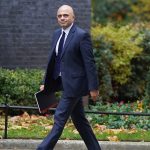The health secretary has announced the government will block-book beds in residential homes so around 2,500 people can be released from hospitals when they are medically fit to be discharged.
Steve Barclay gave a statement to the Commons outlining the government’s plans to help ease the “severe pressures” on the NHS – hours after his talks with unions to stop strikes ended in failure.
He admitted the “experience” for some patients and staff in emergency care has not been “acceptable” in recent weeks.
He said the recovery of the health service falls into three main categories:
To tackle pressures now, Mr Barclay said the government will block book thousands of care home beds in England to “free up” capacity in hospitals, costing £200m.
To increase capacity in A&E, he said the government will introduce “modular units” costing £50m to expand the space available.
The health secretary told MPs the number of people in hospital with flu “this time last year was 50”, whereas this year, “it was over 5,100” – as he once again sought to blame the NHS pressures on flu, COVID and Strep A.
Westminster Accounts: MPs accused of failing to give ‘sufficient’ transparency on major donations
Westminster Accounts: Rishi Sunak says ‘transparency really important’ as focus turns to MPs’ second jobs
NHS strikes to go ahead after union meeting with health secretary Steve Barclay breaks down
However, health leaders have previously criticised this line from the government, saying the “fundamental problem” is the workforce shortage.
There are around 132,000 vacancies in the NHS and 165,000 across social care, about the same size as the population of Newcastle.
Read More:
Workforce the size of Newcastle needed to ease ‘gridlocked’ health and care system
Shadow health secretary Wes Streeting called the solutions announced today “sticking plasters” and said there needs to be more staff in both the health and care sectors, better pay, more training and more investment in primary care so people can access GPs.
He said “everyone knew” the NHS would come under pressure this winter and the plans today are “simply too little, too late”.
“After 13 years, this just isn’t good enough. The prime minister might not rely on the NHS, but millions of ordinary people do, and they are sick and tired of waiting,” he said.
The statement comes after Mr Barclay failed to prevent further strikes in the NHS as talks with union bosses broke down.
Despite the prime minister saying he was “happy to talk about pay” – in what was seen as a breakthrough – Unison said there were no “tangible concessions” which would enable Wednesday’s ambulance strikes to be called off.
The Royal College of Nursing (RCN) said ministers “have a distance to travel” to avert its second-ever set of strikes on 18 and 19 January, while Unite said any suggestion that a one-off pay reward could be made in exchange for a boost in productivity was “absolutely ludicrous”.





















